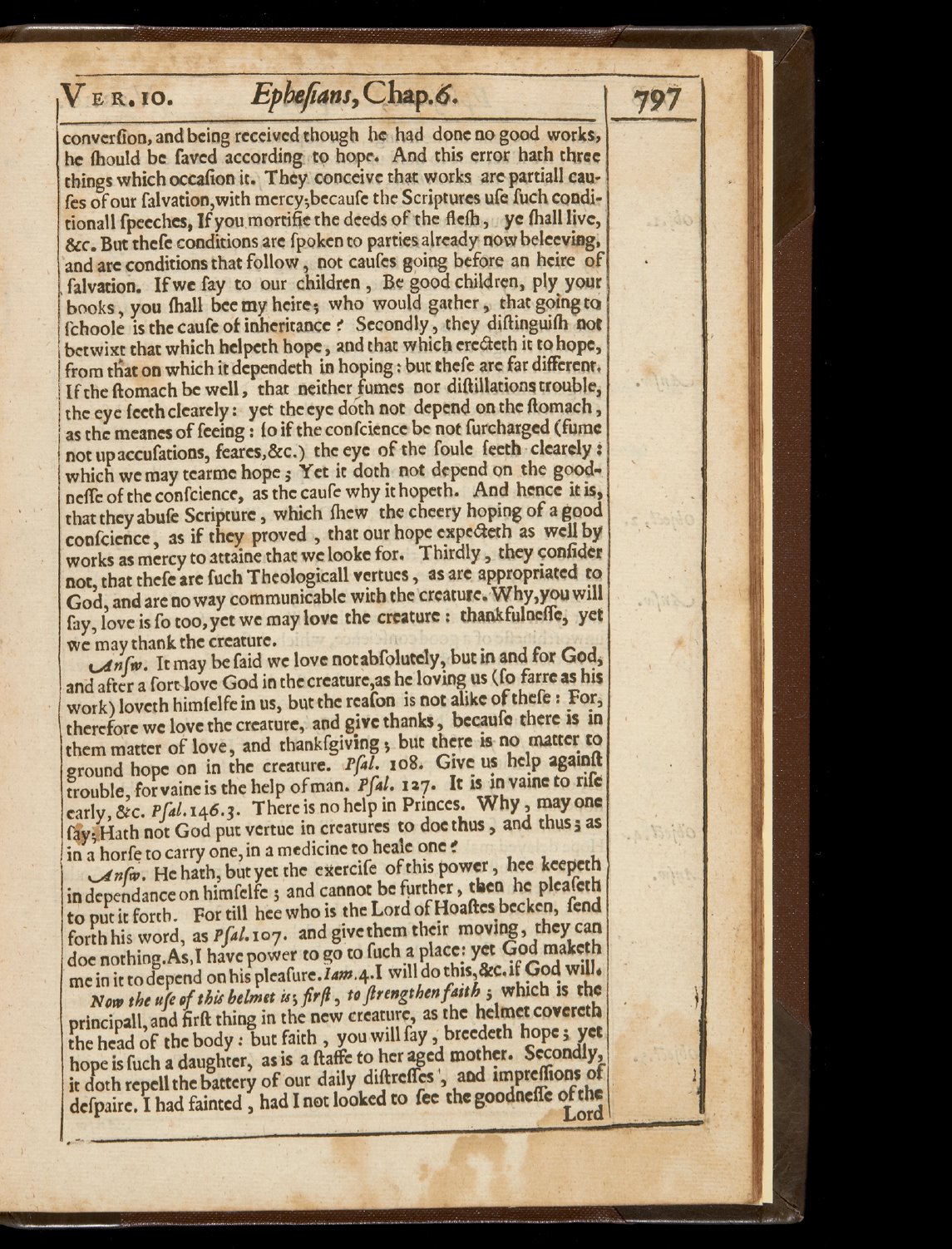

V
E
R.
IO.
Ephefiana,Chap.6.
converfion, and being received though he
had
done no good works,
he
fhould be faved
according
to
hope. And
this
error hath three
things which
occafion it.
They
conceive
that works
are partial!
cau-
fes
of
our falvation,with mcrcy;becaufe the Scriptures
ufe
fuch condi-
tionall fpeeches,
If
you mortifie
the
deeds
of
the flefh,
ye
!hall
live,
&c.
But
thefe conditions
are fpoken to parties already
now beleeving,
and are conditions
that
follow,
not caules going before an
hhire
of
falvation.
If
we
fay
to
our children
,
Be
good children, ply your
books,
you
Thall
bee
myheire;
who
would
gather,
that going
to
fchoole
is
the
caufe
of inheritance
e
Secondly,
they
diflinguifh
not
betwixt that which
helpeth
hope,
and
that
which
ereeteth
it
to hope,
from that
on which
it
dependeth
in
hoping
:
but thefe
are far different.
If
the flomach
be
well,
that
neither
fumes nor
diftillations
trouble,
the
eye
feethclearely: yet
the
eye
doth not
depend on the
ftomach,
as
the
meanes
of
feeing
:
fo
ifthe
confcience be
not furcharged (fume
not upaccufations,
feares,
&c.) the
eye
of
the
foule
Teeth
clearely
which
we may
tearme hope ; Yet
it
doth not
depend on
the good-
neffe
of the confcience,
as
the
caufe
why
it
hopeth. And
hence
it
is,
thatthey
abufe Scripture ,
which
thew the cheery hoping
of
a
good
confcience,
as
if
they proved
,
that
our hope
expe
teth
as
well
by
works
as
mercy to attaine
that
we looke for.
Thirdly
, they confider
not,
that thefe
are fuch
Theologicall
verrues
,
as are
appropriated to
God,
and areno way
communicable with the creature.
Why,you
will
fay, love
is
fo
too, yet
we may love
the
creature
:
thankfulneffe,
yet
we
may
thank the
creature.
1.4n
fro.
It
may
be
Paid
we
love
not abfolutely, but
in
and
for
God,
and
after
a
fort
love
God
in
the creature,as
he loving
us
(fo farre
as
his
work) loveth
himfelfe
in
us,
but the reafon
is
not
alike
of
thefe
:
For,
therefore
we love
the creature,
and
give
thanks,
becaufe there
is in
them matter
of
love,
and thankfgiving
;
but there
is
no matter
to
ground hope
on
in
the creature. PM.
io8.
Give
us
help againfi
trouble,
forvaine
is
the
help
of
man. Pfal. 127.
It
is
in
vain
to
rife
early, &c. Pfal.146.3. There
is
no help
in
Princes.
Why
, may one
fay;
Hach
not
God
put verrue
in
creatures
to
doe
thus , and
thus;
as
in
a
hone
to carry one,
in a
medicine
to beak
one
c
L.in
fro.
He
hath, but yet
the exercile
of
this
power ,
hee keepeth
in dependance
on himfelfe
;
and
cannot be
further,
then
he
plcaleth
to
put
it
forth. For
till hee who
is
the Lord
of
Hoaftes
beckon, fend
forth
his
word,
as
Pfal.107.
and give
them their moving, they can
doe nothing.As,1
have
power
to go
ro fuch
a
place: yet
God
maketh
mein
it
to
depend on
his
pleafure.lam.4.I
will do
this,&c.if God
will.
Nov
the
ufe
of
this helmet
u;
f
rff
,
to
flrengthen
faith
; which
is
the
principal!, and
firft
thing
in
the new creature,
as
the helmet covereth
the
head
of
the body
:
but
faith
,
you will
fay
, breedeth
hope;
yet
hope
is
fuch
a
daughter,
as
is
a ftaffe
to
her aged
mother. Secondly,
it
doth
repell the
battery
of
our daily
diftreffes',
and impreflions
of
defpaire.
I
had fainted
,
had
I
not looked
to
fee
the
goodneffe
of
the
797

















